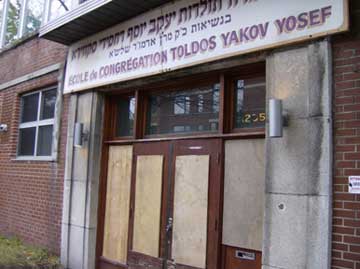I had just moved into a new apartment in Montreal’s ethnically mixed borough of Outremont when the Jewish school down the street was firebombed. Standing on the sidewalk in my slippers with my girlfriend as the fire trucks and police cars arrived, a neighbour walked by and said, dryly, “bienvenue à l’Outremont.”

With this incident fresh in my mind I attended the World Religions After September 11th conference. Essentially organized to promote a roadmap for peace designed by religious groups, the conference’s ultimate goal was the recognition of a “Declaration of Human Rights by the World’s Religions” – a sort of Geneva Convention for the spiritually aware. Over 5 days a total of 225 speakers assisted in workshops, presentations, panel discussions and individual presentations, all speaking about the need for a greater understanding of the issues we face in an increasing complex, fractious world.
While most presentations I attended were stimulating, I couldn’t help feeling that there was a lot of talking going on. There were people talking about their own beliefs, talking about others’ beliefs, talking about talking about beliefs. As the conference was going on, bombs were still falling on Israel, Lebanon, and Palestine, and the Jewish school by my house was boarding over the windows blown out by a Molotov cocktail. Where would all this talking take us, I wondered. Was this just an exercise to help us feel less frustrated, less ineffectual in the face of this violence? On the third day of the conference, ascent’s Managing Editor, Anurag Dhir, and I decided to take a break, and go debrief over lunch in a pub. Live coverage of the Dawson College shooting was broadcasting on the pub’s television.
The media coverage of the Dawson tragedy was inconsistent. Faced with an incident happening in real time, but without the full facts of the situation (how many shooters, how many shot, how many injured, how many fatally) reporters attempted to string together the storyline based on allegations and hearsay. They reported primarily what they heard from students or teachers, deeply shaken by what they had experienced and often unsure of the facts themselves. These reconstructions were then repeated by the TV anchors in French and English in 10 or 15 minute intervals. It took nearly 24 hours to find out the basic facts of the situation (in the end, it was a single shooter, 19 injured, and one young woman killed), and by then most people had spoken to friends and loved ones and received the story first-hand.
In light of this, Anurag and I reflected on our role as media at the World Religions After September 11th conference. We found ourselves being drawn less toward reporting the facts of the conference, and drawn more toward bearing witness, listening more deeply, speaking more honestly, and trying to find the connections between people. In part this was because we saw how the media can falter when it relies on its standard practices, but in part it also had to do with just recognizing the importance of people. The Dawson tragedy made us seek a deeper connection with people because, to be frank, we never know what can happen and how much time we have with each other. More than anything else, that seemed to be the theme of the week.
Back at the conference, the tenor of discussion had shifted after the Dawson shooting. Speakers such as Karen Armstrong, Seyyed Hossein Nasr, and Swami Dayananda Saraswati led discussions that were more probing of sensitive topics, and offered more solutions than merely academic pyrotechnics. Tough questions were suddenly being asked, and audiences and panelists alike recognized the importance of addressing them. The backdrop of September 11th, a renewed Middle East conflict, and a shooting rampage in Montreal seemed to ground the conference very suddenly, and people were more willing to be exposed toward each other, and allow their sincere concern to become more apparent.
I found this shift invigorating. What had initially alienated me from the conference—endless talking—was suddenly the very thing that drew me in. I found by listening more closely to what others were saying they suddenly seemed to be saying more than I had previously heard. People were making eye contact, asking questions of each other, clarifying items they did not understand, and sharing their opinions on issues of the day without trying to drown out other opinions. Fueled by unusual (and as noted, often unfortunate) circumstances, for a brief time there was truly honest discussion between people of different faiths, and it occurred to me that while this in itself is not going to stop Middle East conflict or the firebombing of Jewish schools, none of this violence would cease without such discussion. For however optimistic or ambitious the goals of the World Relgions After September 11th conference, they provided the backdrop for the first significant step to ending the differences between us – by allowing us to recognize them and address them.
Cycling home to Outremont on the final day of the conference I passed the recently-bombed Jewish school. Now quiet, with boards over the front doors and some windows, I noticed a series of security cameras surrounding its perimeter that I hadn’t noticed previously. Given the context for this bombing—that the arsonist was still at large, the building still showed the damage—I wasn’t convinced that discussion could significantly address this violence. After what I had experienced at the World Religions After September 11th conference, I was convinced that without discussion we haven’t much else: in some ways, speaking to each other and (more importantly) listening to each other, is our greatest tool of defense, our best instrument of change, and really, both the simplest and most difficult thing in the world.
Photos by Scott W. Gray